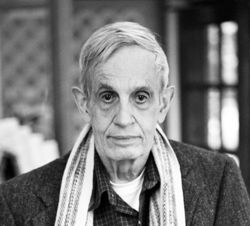Difference between revisions of "John Nash"
m (cat. history + hex community) |
(Added a picture of Nash from Wikimedia Commons) |
||
| (5 intermediate revisions by 2 users not shown) | |||
| Line 1: | Line 1: | ||
| − | '''John Nash''' was | + | [[Image: John Forbes Nash, Jr. by Peter Badge-cropped.jpg|right|250px]] |
| + | '''John Forbes Nash Jr.''' (1928-2015) was a renowned economist and mathematician who made significant contributions to the field of game theory, the study of strategic decision making. He is best known for his work on the Nash equilibrium, a concept that is widely used in economics and other disciplines. He shared the 1994 [http://en.wikipedia.org/wiki/Nobel_Prize Nobel Prize] in Economics for his work in this area. | ||
| − | + | == Nash and Hex == | |
| − | Nash | + | In addition to his contributions to economic game theory, Nash is also credited as one of the inventors of the game of [[Hex]]. According to Nash, he independently invented Hex at Princeton in 1948 or 1949. However, there is some uncertainty about whether his rediscovery of the game was truly independent, as it is known that Hex had already been brought to Princeton by Danish students by early 1948. One of these students was Aage Bohr, the son of Niels Bohr and a friend of [[Piet Hein]]. Therefore, Nash may have been exposed to the game, perhaps without realizing it. See [[History of Hex]] for more details. |
| − | + | Nash's fellow players at first called the game "Nash." There is a rumor that the game was also known as "John" at Princeton because it could be played on the hexagonal tiles of a bathroom floor. However, Hayward and Toft state that they were unable to find any records or other evidence to support this claim. | |
| − | Nash | + | == Nash in popular culture == |
| − | + | ||
| − | A | + | Nash's life and struggles were depicted in the bestselling book "[http://www.amazon.com/exec/obidos/tg/detail/-/0684853701/qid=1091736037/sr=8-1/ref=sr_8_xs_ap_i1_xgl14/103-5668637-5984658?v=glance&s=books&n=507846 A Beautiful Mind]" and the subsequent movie of the same name, which starred Russell Crowe as Nash. The film was highly successful and won several Academy Awards, including Best Picture. [http://www.imdb.com/title/tt0268978/ (source)] |
| − | [http://www. | + | |
| + | == Honors == | ||
| + | |||
| + | In addition to the [http://en.wikipedia.org/wiki/Nobel_Prize Nobel Prize] in Economics [https://www.nobelprize.org/prizes/economic-sciences/1994/nash/facts/], Nash also won the 2015 [http://en.wikipedia.org/wiki/Abel_Prize Abel Prize] in Mathematics [https://abelprize.no/abel-prize-laureates/2015], making him the only person to have won both prizes. | ||
[[category:History]] | [[category:History]] | ||
[[category:Hex community]] | [[category:Hex community]] | ||
| + | [[category:Person]] | ||
Latest revision as of 02:55, 21 April 2023
John Forbes Nash Jr. (1928-2015) was a renowned economist and mathematician who made significant contributions to the field of game theory, the study of strategic decision making. He is best known for his work on the Nash equilibrium, a concept that is widely used in economics and other disciplines. He shared the 1994 Nobel Prize in Economics for his work in this area.
Nash and Hex
In addition to his contributions to economic game theory, Nash is also credited as one of the inventors of the game of Hex. According to Nash, he independently invented Hex at Princeton in 1948 or 1949. However, there is some uncertainty about whether his rediscovery of the game was truly independent, as it is known that Hex had already been brought to Princeton by Danish students by early 1948. One of these students was Aage Bohr, the son of Niels Bohr and a friend of Piet Hein. Therefore, Nash may have been exposed to the game, perhaps without realizing it. See History of Hex for more details.
Nash's fellow players at first called the game "Nash." There is a rumor that the game was also known as "John" at Princeton because it could be played on the hexagonal tiles of a bathroom floor. However, Hayward and Toft state that they were unable to find any records or other evidence to support this claim.
Nash in popular culture
Nash's life and struggles were depicted in the bestselling book "A Beautiful Mind" and the subsequent movie of the same name, which starred Russell Crowe as Nash. The film was highly successful and won several Academy Awards, including Best Picture. (source)
Honors
In addition to the Nobel Prize in Economics [1], Nash also won the 2015 Abel Prize in Mathematics [2], making him the only person to have won both prizes.
